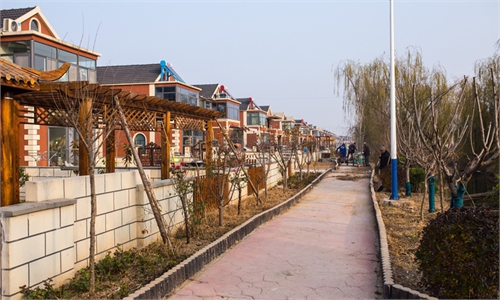IN-DEPTH / IN-DEPTH
Cultural and creative industries shine in Jining, a city rich in culture and history
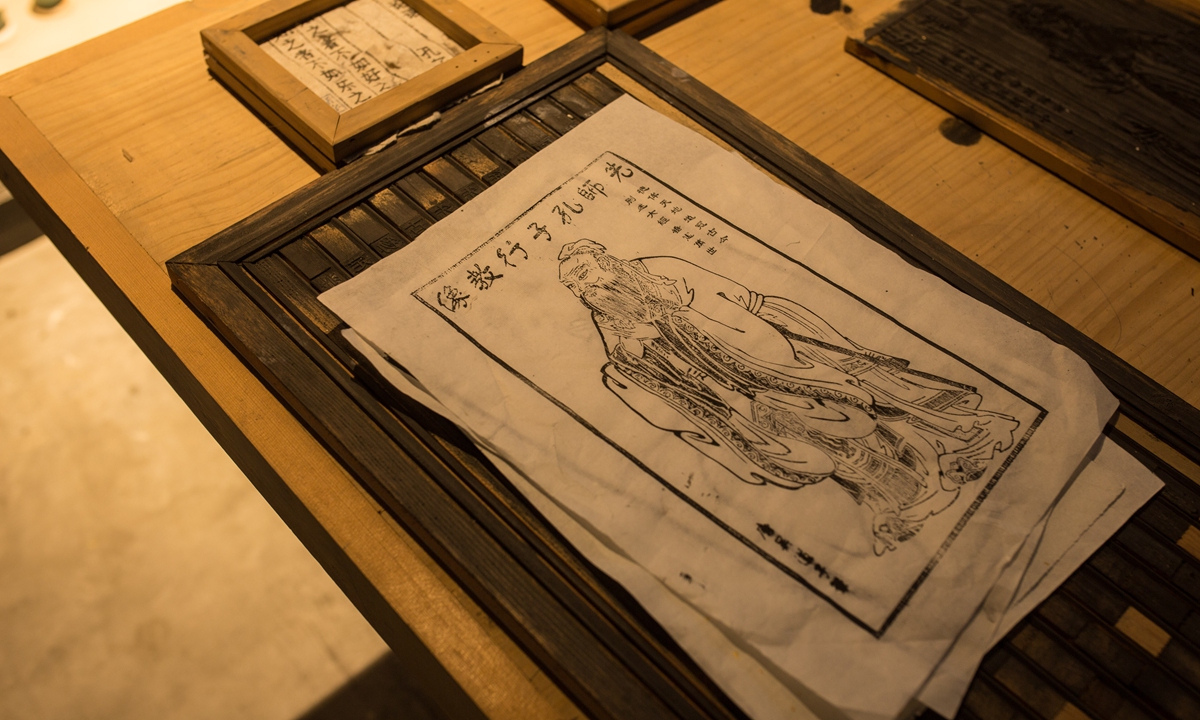
A portrait of Confucius Photo: Shan Jie/GT
It is the birthplace and origin of Chinese ethics and culture. It is the starting point of Confucianism and the breeding ground of great philosophers, from Confucius to Mencius, among others. Jining is the most important transit hub between China's northern and southern cultures as it sits in the middle of the significant Beijing-Hangzhou Grand Canal.
Through globalization, the economy has become increasingly integrated and the rapid development of the Internet has formed a "global village" while other industries, especially in the high-tech sector, have increasingly converged but culture cannot be replaced.
With a cultural treasure passed down through thousands of years, nowadays, the city has promoted its cultural and creative industries as a way to perpetuate the life and spirit of ancient culture and showcase the city's unique charms.
In recent years, Jining has continuously been improving the layout of cultural and creative industries, actively expanding the industrial supply chain and creating an innovation and entrepreneurship ecosystem that integrates technology business incubators, accelerators, and industrial parks.
Creativity has injected vitality to culture, stimulating industrial development and the cultural resources in Jining are keeping an eye on the bigger world.
Inheriting Confucius' legacy
Kong Kai, 35, is Confucius' 76th generation of descendants. Today, he has a special role as the Executive Director and host of the annual Confucius Memorial Ceremony.
In the past decade, during the ceremony held at the Temple of Confucius every September 28 on Confucius' birthday, Kong has read the tribute in a considered tone and cadence.
The annual ceremony is a grand festival for regions deeply influenced by Confucianism that is broadcasted on TV to the world. But what people see today is the result of Kong and his colleagues' cumulative efforts and sweat.
The Confucius Ceremony, passed down through generations in history, was halted in 1955 and was not performed again until more than 40 years later. It was in 2010, when Kong took over the job of hosting the ceremony, that the revamp of the thousand-year ceremony fully started.
Kong said that at the time, he and his team read a lot of documents and asked for advice from musicians that played ancient instruments and performers who had participated in ceremonies before the moratorium.
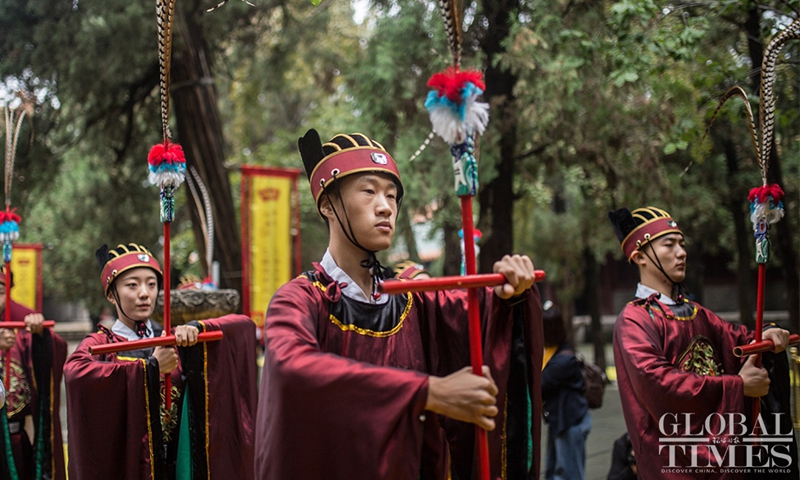
The Confucius Memorial Ceremony on September 28, 2021 Photo: Shan Jie/GT
They have also added some new creations to make the aesthetics and form more acceptable to modern society. For instance, after "translating" the ancient traditional music scores and introducing modern touches, the team adapted some notes to make the melody "playable."
"The memorial to Confucius has been performed since ancient times and the present ceremony imitates the rituals, props and costumes, and combines modern etiquette," Kong told the Global Times.
He believes that Confucianism is an important part of Chinese culture. Performing the ceremony allows future generations to find their own roots and experience the charm of traditional Confucian culture.
On September 28, 2021, a grand ceremony to mark Confucius' 2,572nd birthday and pay homage to the great ancient philosopher was held in Qufu, Jining. Hundreds of people took part in the ceremony at the Temple of Confucius, including local senior officials, foreign envoys, scholars, and Confucius' descendants. Similar ceremonies are also being held around China and in South Korea.
This year, elements featuring the efforts to fight the COVID-19 pandemic were also added in the ceremony.
"It is like preparing an annual report for our ancestors," Kong said, "but it is also necessary for people today to understand that we should remember and show respect to and be in awe of certain things."

The Confucius Memorial Ceremony on September 28, 2021 Photo: Shan Jie/GT
Nowadays, the Confucius ceremony is the most important event in the Confucius scenic spot in Jining. Meanwhile, many products have been created and promoted around the city's biggest cultural icon.
In October, a customized popsicle featuring Confucian elements was released in Qufu. Within four days, sales volumes had surpassed 40,000 units.
Although impacted by the pandemic, the income from selling Confucius-related products reached 7 million yuan in 2020 ($1.1 million). Du Cheng, who is in charge of sales at the Sankong Cultural and Creative Company in Qufu, told the Global Times.
"Many parents want to buy a ferule for their children inside the Confucius Temple," Du said. "They believe that the ferule is likely more effective."
Serving society
These cultural and creative industries could boost the local economy while shouldering some social responsibility. This has been illustrated by some cultural companies in Jining.
More than 70 percent of the employees at the Meiyuantao Art Porcelain Company in Jining are persons with disabilities. They are hired as artists in the company to draw and paint Confucius, pandas, and flowers onto porcelain and papers in the unique style and skill only used in Jining.
Seven years ago, following suggestions from the local government, Shao Zheng, a successful businessman in Jining, started the company. "I wanted to do something to give back to the society," Shao told the Global Times.
He started by recruiting some young people with either hearing or mobility disabilities which do not affect their artistic abilities and hired teachers to train them.
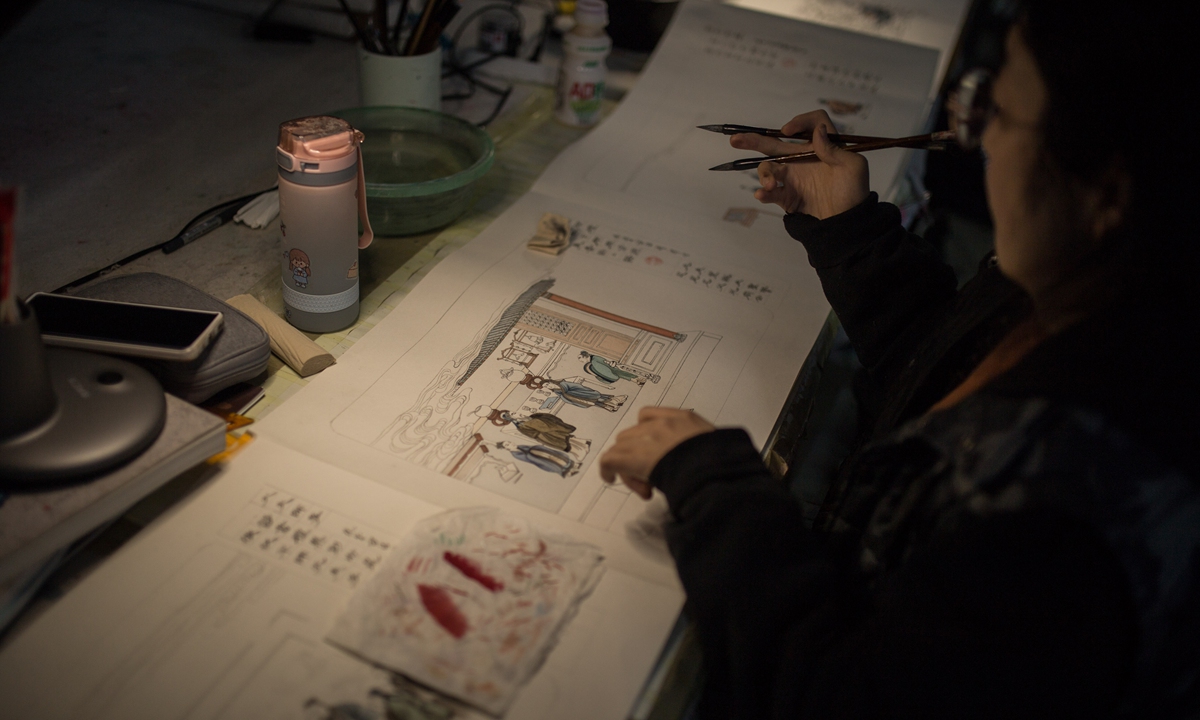
Artist with disabilities draw in traditional Chinese style in the Meiyuantao Art Porcelain Company in Jining. Photos: Shan Jie/GT
Kong Dongqing, 21, was one of the "most experienced" artists in the company. She is talented in coloring and often helps newcomers hone their skills.
"I had never thought I could do a job that I truly enjoy," she said. "Here I have made many friends and shared my knowhow with them."
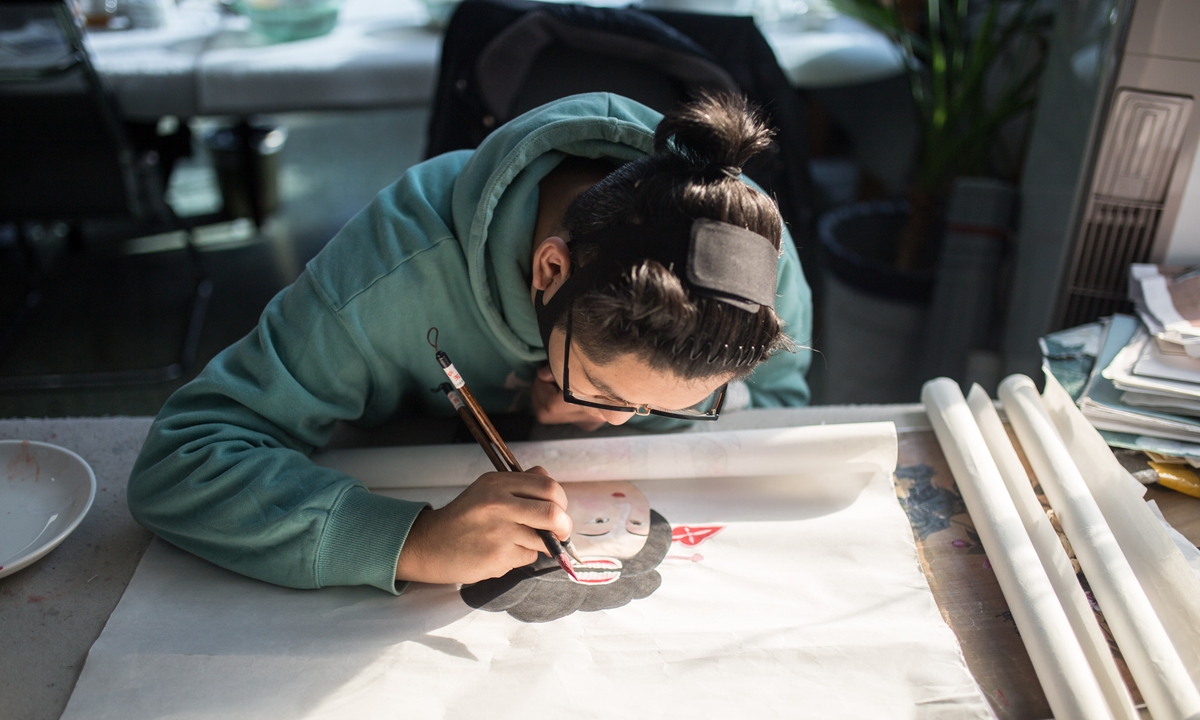
Artist with disabilities draw in traditional Chinese style in the Meiyuantao Art Porcelain Company in Jining. Photos: Shan Jie/GT
Nowadays, the delicate porcelain painted with stories of the life of Confucius or other elements loved by people, such as pandas, flowers and ancient beauties, are displayed and sold in China and in other countries like Italy.
Shao's company has solved the problem of unemployment among people living with disabilities, and in addition "at least three couples have since met in my company and have started their own families," he said proudly.
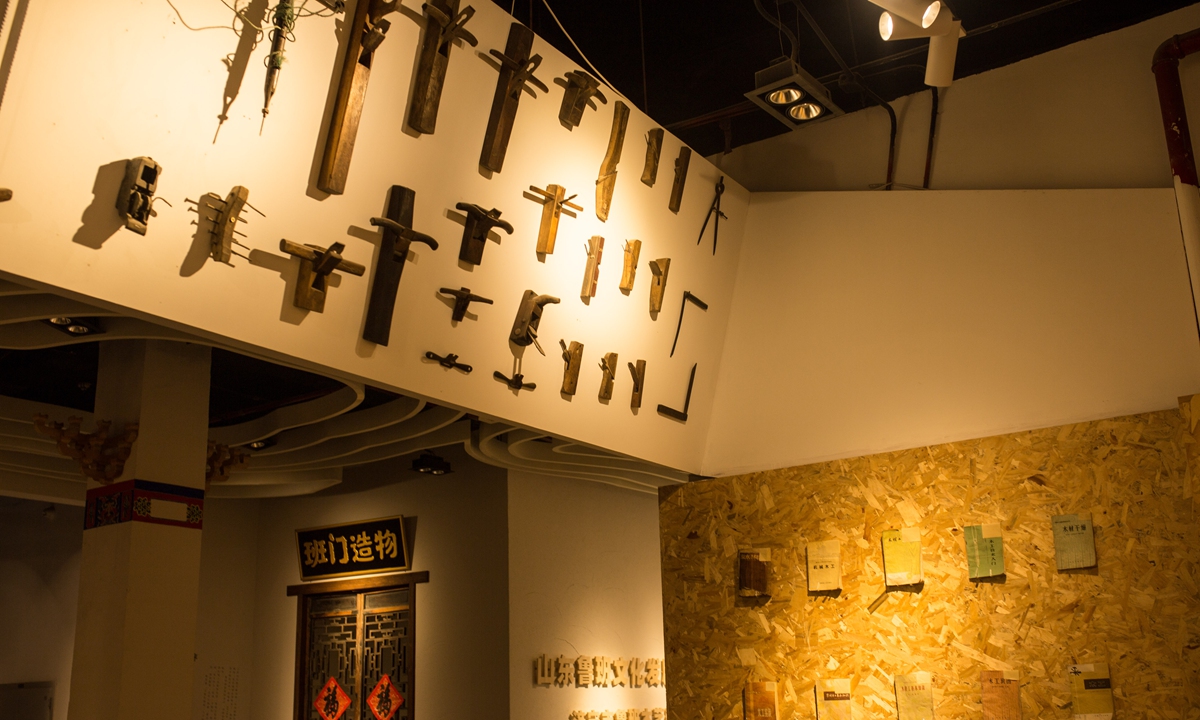
Carpentry tools and handbooks are displayed at the workshop of Lu Ban Culture Development Company in Jining. Photo: Shan Jie/GT
The workshop of Lu Ban company is like a miniature museum of Chinese traditional carpentry. It is also a space for children to have an experience on carpentry, know the tools, acquire skills, and create something with their own hands.
Moreover, the company has developed a carpentry box with materials, tools and a handbook which has been promoted in many schools in China and in other countries such as Singapore.
"Confucius is a representative of arts and humanities while Lu Ban is a representative of engineering," Lin Fang, the owner of the Lu Ban company, told the Global Times. "We would like to inherit the spirit of craftsmanship of Lu Ban, and the company and our products are the conduits to spread his spirit," Lin highlighted.
Going to the world
In the past decades, cultural and creative industries in Jining have also been exploring international exposure and have gradually become a calling card for the city.
Recently, a grand acrobatic show inspired in Liang Shanbo and Zhu Yingtai, debuted in Jining after two years of preparation with great success.
The story of Liang Shanbo and Zhu Yingtai is familiar to every Chinese and is known in the world by the name of "The Butterfly Lovers." People call it "the oriental Romeo and Juliet." The melody of Liang and Zhu has become one of the most iconic pieces of Chinese music.
The touching love story also happens in today's Jining as well. That is why the Jining Acrobatic Troupe decided to go ahead with the project.
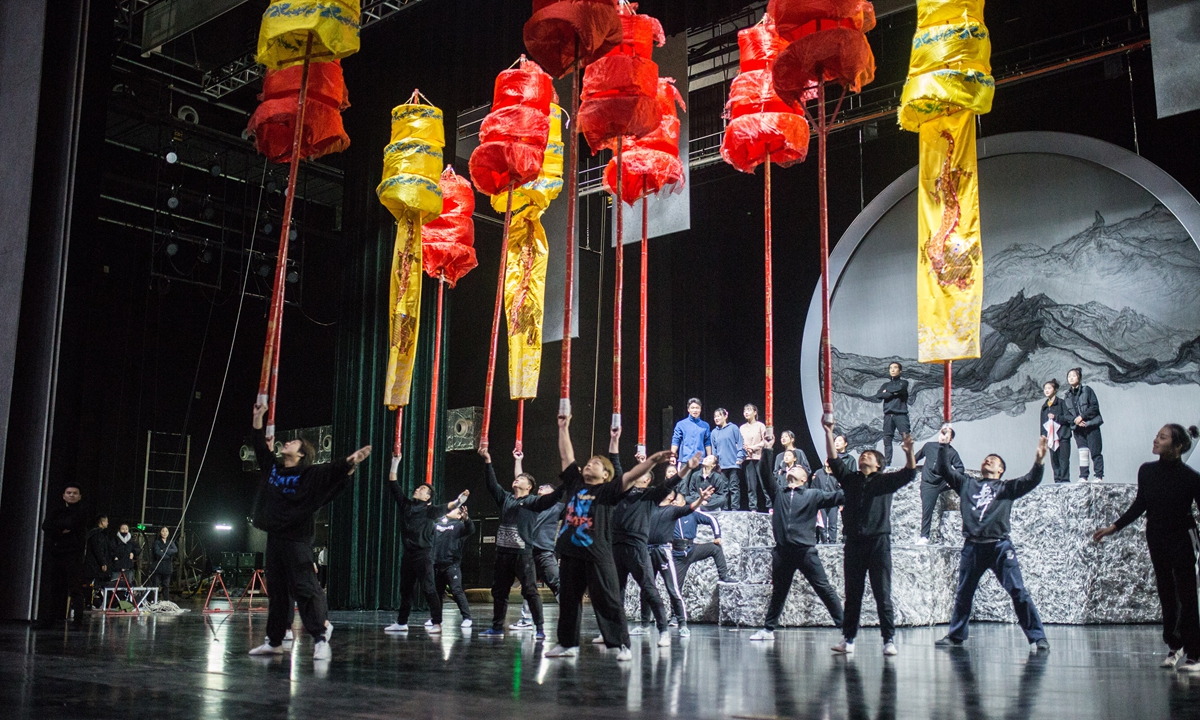
Rehearsal of the acrobatic show Liang Shanbo and Zhu Yingtai by the Jining Acrobatic Troupe. Photo: Shan Jie/GT
The Jining Acrobatic Troupe has been traveling around the world but the global tour was brought to a halt due to the pandemic and the troupe had to focus on planning and rehearsing the Liang Shanbo and Zhu Yingtai show.
The performance is designed in a more international style and incorporates modern aesthetics combined with a traditional Chinese images," the director said. It is a mixture of beauty, romance, youth and moving emotion.
"After the pandemic, we would like to perform this show in other countries to spread this classic Chinese story in the world," Zhao Jiangang, Manager of the Jining Acrobatic Troupe, told the Global Times. "A life of a good and qualified show could last very long. We are patient enough and believe our show will shine in the world one day," Zhang remarked.

